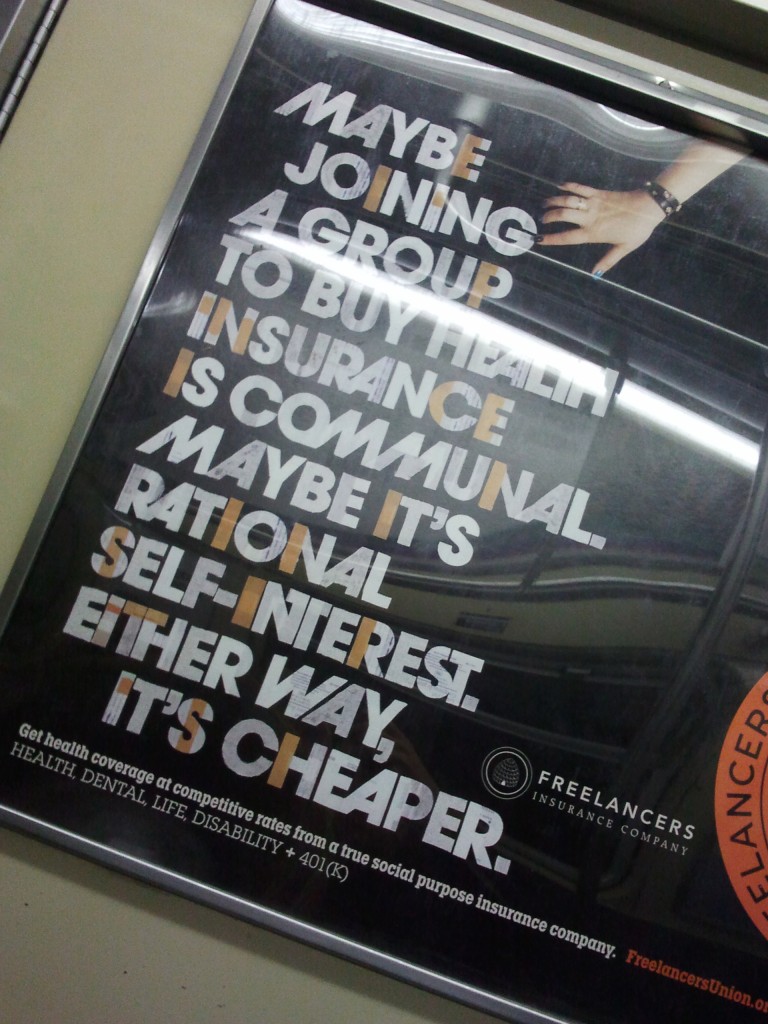An anonymous reader snapped a photo of this ad for Freelancers Insurance Company in the NYC subway. The ad reads: “Maybe joining a group to buy insurance is communal. Maybe it’s rational self-interest. Either way, it’s cheaper.” With the phrase “either way,” the ad draws on a common juxtaposition: the idea that putting the group first is equivalent to sacrificing your own interests.
Certainly in some cases it’s true that privileging the collective hurts the individual, but this certainly isn’t always true. Yet Americans consistently receive the message that it is rational (i.e., maximizes our personal well-being) to put ourselves first. A University of Minnesota campaign to encourage students to get the flu shot — “Do it for the herd”— is a nice counter-example. In some other societies the idea that one should sacrifice the self for others, and even the idea that doing for others is good for you, is a more common cultural theme.
Lisa Wade, PhD is an Associate Professor at Tulane University. She is the author of American Hookup, a book about college sexual culture; a textbook about gender; and a forthcoming introductory text: Terrible Magnificent Sociology. You can follow her on Twitter and Instagram.

Comments 17
Anonymous — July 17, 2011
I'm sensing that what they were trying to do was juxtapose communism versus capitalism, then saying that either way, you benefit. With this interpretation, doing things for the common good and doing them for yourself have equal outcomes.
mvd — July 17, 2011
I disagree with your interpretation. It seems to me that "either way" is saying "whatever your motivation." It is making no moral statement about one's motivation, but rather saying that the outcome is the same.
Yrro Simyarin — July 17, 2011
Well, among other things, rational self-interest will automatically include the set of choices that are both best for the community and best for you. For all other cases, by definition they are in conflict, although that doesn't necessarily mean that what is best for the community is *bad* for the individual, just that it is sub-optimal.
Anonymous — July 17, 2011
Since rational self-interest involves whatever choice benefits you the most (which may be a choice that also benefits the community most) it's nonsensical to say that sacrificing one's own interests can be within the scope of rational self-interest. It's false by definition.
Yrro Simyarin said it better than I did.
Saby — July 17, 2011
As a Canadian, I think that right there sums up what many of us find so perplexing about the American ethos of individualism. The passionate reaction of some people against, for example, Obama's healthcare legislation, or even just taxation, is just a little bit befuddling. But as far as I can make out, it seems to be an individual/communal thing.
Then again, "peace, order, and good government" are some pretty damn communal goals, so maybe I'm a bit biased on the side of the communal...
srk — July 19, 2011
I think you have totally misread this advertisement. First of all, it is advertising for health insurance. Why would it be subliminally saying that health insurance is a way to subjugate yourself to a group? The point of the ad is that whether you want to make a decision that benefits the community or you want to make a decision that benefits yourself, the cheapest option (for both points of view) is this company's health insurance. It isn't trying to draw a dichotomy other than saying, "Hey, this is great for everyone at either end of the spectrum of individualists and communalists!"
Love this website, but I think this post has it all wrong.
farimaf — June 20, 2025
It made me think about my own experiences with insurance, and I couldn’t help but wonder how often companies prioritize customer service over claims processing. I looked up https://allstate.pissedconsumer.com/customer-service.html to see what others were saying about their experiences with Allstate. It's interesting to see how different people have had mixed feelings, especially when dealing with claims. Hopefully, future policies shift towards more transparent and customer-friendly approaches.